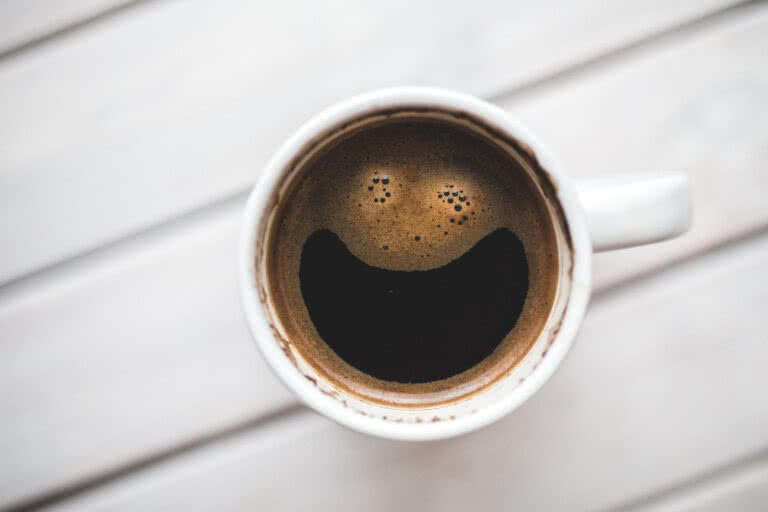Coffee is the fuel of the UK workforce. According to a survey of 10,000 professionals by Pressat, 85% drink at least three cups a day, and 70% believe their performance would be affected without it.
Event organisers tend to be especially dependent on the stuff when on site, harnessing regular caffeine boosts to propel themselves through long and busy days at their events. You couldn’t do you job without it, right?
But as you sink your third Americano of the day, do you ever pause to think about the effect all that coffee is having on your mind and body? If you’re curious to know, here’s something to read while you wait for your cafetiere to percolate…
Related: 5 of the best London coffee shops
1. It triggers your ‘flight or fight’ mode
The rush of energy we get from a strong coffee is caused by a caffeine-triggered chemical reaction that tells our adrenal glands to produce adrenalin. Within 15-minutes of drinking coffee, adrenalin is released, putting the body into ‘fight or flight’ mode.
It is basically a stress reaction; hence why it leads to a feeling of increased energy and heightened senses (it can even give you sharper vision as adrenalin causes your pupils to dilate).
This so-called ‘fight or flight’ mode is the evolutionary protection mechanism we developed to outrun predators and battle foes, and it can be a lifesaver. But what happens to today’s office warriors who self-induce this state continually, every day?
It’s easy to become addicted to this quick and easy energy boost, but when the caffeine starts to wear off we often feel even more lethargic. Typically, coffee will stop you feeling tired for around three hours but after that you’re headed for a ‘coffee crash,’ and this is when we reach for another hit.
Thanks to this vicious cycle, we end up building a tolerance to caffeine and therefore need more of it to gain the same effect. Constant caffeine consumption forces our adrenal glands to produce more and more adrenaline. In the worst cases, it can eventually exhaust them, leading to feelings of emotional, mental, and physical ‘burnout’.
Related: How to stay clam and reduce stress before an event
2. It boosts brainpower
Many people drink coffee to increase their concentration. Caffeine helps to enhance levels of alertness by inducing the production of dopamine – a neurotransmitter that controls attention and motivation.
Studies show that coffee could enhance memory for up to 24 hours after consumption and that regular coffee consumption over a lifetime could even reduce the risk of developing Alzheimer’s disease.
However, for most people, one mild coffee is all it takes to bring dopamine to optimum levels in the brain, enabling you to focus on your work – any more and it could push dopamine levels too high causing restlessness and anxiety.
Related: 6 Ways to increase your focus and get more done
3. It affects your mood
Dopamine is often referred to as the ‘feel good’ hormone. This is because it also plays an important role in controlling the brain’s reward and pleasure centres and helps to regulate emotional response.
Small amounts of caffeine can help reduce anxiety levels and make you feel happier (we all know people that we wouldn’t even think of approaching until they’ve had their morning coffee!). It’s even been shown to help with depression.
But just like before, it’s all about getting the balance right. Too much coffee can make you short tempered, irritable and down.
Related: How to deal with early starts when you’re not a morning person
4. It accelerates your heart rate and opens up your lungs
Once it enters the bloodstream through the stomach, the caffeine in coffee starts to block phosphodiesterace – the enzyme that helps keep heart rate in its normal range. It stimulates the receptors within the heart to beat faster, which leads to greater blood flow and a raised body temperature.
Increased heart rate can make you feel more energised, which is why caffeine drinks are sometimes used by athletes to improve performance. Caffeine also improves cardiovascular performance by opening up the airways in the lungs making it easier to breathe.
Caffeine can increase heart rate by approximately three beats per minute but not everyone will experience the same effects. The way that caffeine affects you will depend on your size and your tolerance. People who weigh more and consume caffeine regularly typically have a higher tolerance to its effects. If you consume caffeine on a daily basis, it will affect your heart rate less, compared to someone who consumes it once a week or even more sporadically.
For healthy people increased heart rate is not a problem, but may be an issue for those with underlying problems such as heart disease, high blood pressure or abnormal heart rate.
Related: How to find, boost and channel your creative energy
5. It stimulates your bowels
Do you ever experience the sudden need to go to the toilet after a cup of coffee? This is because compounds in coffee stimulate the bowel and can result in waste being pushed out faster than normal.
Turns out the tradition of drinking coffee after a big meal is about more than social nicety – coffee facilitates digestion by raising acid levels in the stomach.
However, increased gastric juices on an empty stomach can irritate the gut lining, causing pain, bloating and heartburn, so coffee is best taken with breakfast rather than first thing in the morning.
Related: 9 Scientifically proven ways to get over a hangover
6. It resets your body clock
While completing dinner with coffee can do good things for digestion, it can be bad news for our sleep quality.
Coffee consumed late in the evening resets the internal body clock by delaying a rise in the level of melatonin, the body’s chief sleep hormone.
Coffee appears to trick the body into thinking that it is around an hour earlier in the day, switching back on bodily functions which should be powering down in the evening.
Not only does it make it harder to fall asleep come bedtime and reduce the total amount of sleep we experience, it also interferes with the amount of truly restorative deep sleep that we enjoy.
The effects of caffeine can occur even when you consume it earlier in the afternoon or evening. One study found that consuming caffeine six hours before bedtime reduced total sleep time by one hour.
Related: How to get a better night’s sleep before your next big event
Conclusion
Coffee and caffeine affects everyone differently and you’ll know what’s the right amount for you. However, the Department of Health recommends adults should limit their intake to 400mg of caffeine per day, which equates to around two to three cups.
Other more healthy ways to energise include eating foods that provide long-lasting energy such as soya beans, trail mix, quinoa, eggs and whole grain cereals and drinking plenty of water to stay hydrated.
Are you a coffee addict? How many cups do you need to get you through the day?





